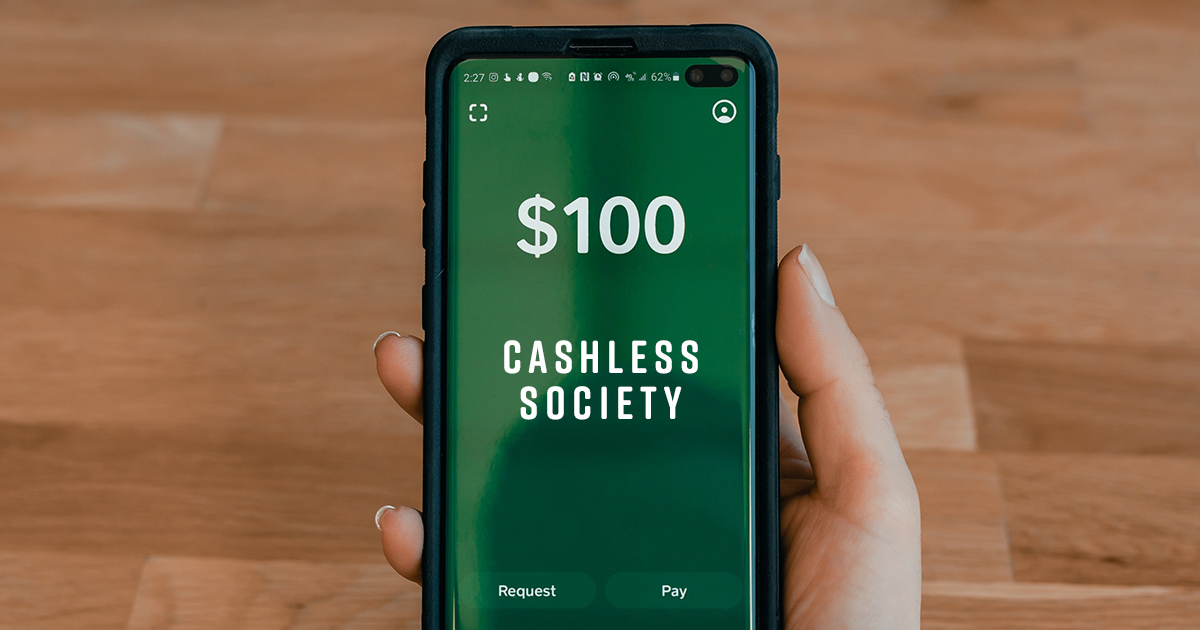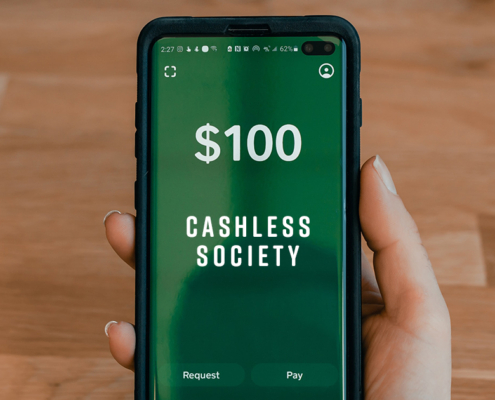A Global Pandemic has Changed the Way We Live, Work and Protect Our Privacy.
By Dave Robbins
May 1, 2021
“He causes all, both small and great, rich and poor, free and slave, to receive a mark on their right hand or on their foreheads, and that no one may buy or sell except one who has the mark or the name of the beast, or the number of his name. Here is wisdom. Let him who has understanding calculate the number of the beast, for it is the number of a man: His number is 666,” (Revelation 13:16-18, NKJV). In the end time, economic control will be used to force the citizens of the world to comply with the dictates of the Antichrist and his one-world government. The plan will be to give everyone on earth their own unique identification number that will be necessary to function in society. If any individual does not submit, obey and pledge allegiance to the Antichrist and his supreme authority, that person’s number will be invalidated. They will not be permitted to hold a job or to participate in the global economy. This individual sanctioning system will require everyone to be participants in a digital society. Hence, the current efforts continue to transition the populace away from cash.
Cashless Society
A cashless society sounds like a great idea. Proponents say a cashless society would make our lives easier, cut down on the illegal drug trade and even help eliminate poverty.
Even though the idea sounds good, moving to a completely cashless society is a threat to our freedom – the most valuable ideal in the United States.
It’s common knowledge most people use cash rarely now choosing the credit card or automatic debiting to pay for groceries, bills and just about every other transaction.
This trend has amplified to a greater degree in the last year due to the pandemic. We have seen stores refuse to take cash to combat the coin shortage or even to eliminate the potential for passing the virus from one hand to another.
But the term “cashless society” is not just referring to using solely credit cards to pay for goods and services. This is a common misconception.
A true cashless society forces everyone onto the electronic banking system, as each person would be forced to use an account to store their monetary funds.
If stores, small businesses, banks and utilities refuse to accept cash, those who desire to live off the grid or to simply not be tracked by “Big Brother” would not have a method to pay for products, services or even health care related costs such as doctors or emergency room visits.
Controlling Society
Many people might say, “I’m okay not using cash. I don’t have anything to hide. It won’t affect me.” This is a naïve and uneducated statement.
When you are not able to control your own privacy and unable to have physical control of your own money, you are allowing someone else to control your freedoms. A cashless society affects every single person because in a fully digital monetary system, any transaction can be controlled by the click of a button.
It’s all about who has that power.
Generally, banks have become a trusted resource for holding cash but there are still those people that want to keep a physical currency under their mattress. If, as a society, we give up cash, then in a sense we are at the mercy of the company that is holding our so-called money.
Not Secure
While people say, “Digital is safer. It’s better. It’s more protected.” Let me remind you of the Y2K scare that happened just over 20 years ago. Or even the most recent Equifax credit score company hack that exposed millions of people’s social security numbers and credit scores on the dark web. And what about the data breach that happened at Target a few years ago regarding financial data being stolen?
Of course, banks aren’t foolproof either. The truth is that when transactions are digital, there can be breaches of information or data being leaked. Even if privacy is promised, you are still at their mercy.
When we have cash on hand, at least there is comfort that there is an option to pay if it were necessary.
Eliminate Illegal Activity?
Another promise of a cashless society is a decrease in illegal activity.
Many cashless society advocates say that a move to a cashless society would decrease the amount of criminal activity. Transactions could not be done “under the table” and money laundering would be significantly reduced. But of course, this is false. As we have seen throughout history, the depravity of man always finds a way.
United Nations Propaganda
Even world agencies promote the idea of a cashless society. The United Nations (U.N.) has been pushing for the entire world to move toward a digital system since the adoption of the 2030 Agenda in 2015.
As a part of the U.N.’s desire to implement their 17 Sustainable Development Goals, a cashless society is high on their agenda. This allows a world government to promote a move toward totalitarianism.
In order to achieve many of their ideas, a global digital currency and a cashless society would be paramount to its success.
As part of their agenda, the U.N. advocates birth registration for every human being on the planet, giving global IDs to all. This includes indigenous people living in remote places along with those living in the hub of modern society. By giving certificates of identity to everyone, it forces even the most indigenous people onto the grid.
Sweden
One country in Europe is focused on making cashless society a reality.
Sweden is leading the way and by 2023 they hope to have fully made the transition. On March 24, 2023, cash will no longer be accepted although it’s already hardly used. They are well on their way to hitting their goal with 80% of Swedes paying for purchases with cards already. In 2012, the six largest banks in Sweden decided to develop an electronic payment system they called Swish. It was embraced and utilized by many in Sweden. In fact, this form of payment became the standard and is used by over half of the population.
Currently, cash transactions are used less than 1% of the time and are highly discouraged. Some benefits that the Swedes have seen from this transition have been less tax avoidance, a decrease in bank robberies, reduction in drug, counterfeit and weapons marketing. Another benefit is that businesses feel safer since there is never any cash in the building. Sweden’s Central Bank began testing their own digital currency they are calling the e-krona in 2019 and has plans to fully implement it this year.
India
The Reserve Bank of India has plans to complete implementation of moving to a cashless system by the end of this year. Back in 2016, the prime minister announced a policy that made 500-rupee and 1,000-rupee currency notes illegal overnight, which made up 86% of the notes in circulation. This caused problems for Indians when suddenly they were unable to use the money they had and replacement currency was not available yet. It was reported that many people were left without any access to cash for up to eight months.
The people were forced to figure out an alternative way to pay for the things they needed.
India’s Prime Minister Modi’s move to demonetize the country was the action that forced everyone into a new digital system.
India Stack, an identity verification system was also implemented in 2016. This is a series of connected structures allowing people to store personal data, using a software system developed in 2009 called Aadhaar. Aadhaar is a biometric database using fingerprints and retina scans.
According to Forbes, since its launch until 2016, 1.1 billion people, which is 95% of the population, now have a digital proof of identity. With India Stack, now Indian citizens are able to open bank accounts, invest in retirement funds or share medical records no matter where they are in the country. All they need is a fingerprint and retina scan.
India hoped to make this transition to cashless without having to impose fees on customers or merchants to switch to the digital system.
United States
In the United States, credit card companies impose merchant fees which in turn cause businesses to increase their prices to cover the additional cost to provide digital forms of payment. Prices would lower if people used cash but inconvenience has outweighed the costs for many business owners and consumers. The prices are increased simply because the majority pay with some sort of card.
Many professional sports, ball parks and stadiums are using contactless payment technology.
The majority of major U.S. airline companies are mostly, if not totally, cashless.
Small Business Trends reports: “A new study by Visa reveals 82% of small business owners are shifting toward digital payments in response to the pandemic. According to the Visa Back to Business Study, small businesses are rolling out new forms of in-store contactless payments. This is to meet COVID-19 wary consumers demanding protection and safety at the point-of-sale (POS).”
“The 82% increase of small businesses using contactless payment is up from the mere 20% in June 2020. And it is showing no signs of slowing down in the New Year. Since the pandemic, small businesses have shifted toward digitizing their operations. This includes selling products and services online (43%), accepting contactless payments (39%), targeted advertising on social media (38%), and digitizing business functions like backend payment operations (30%).”
Tracking the Populace
The other problem with a cashless society is lack of privacy.
In a cashless society, all payments and transactions would be conducted electronically. This creates a record that governments can then study and track as they deem necessary. This has already gone into effect in many places around the world. Governments in Africa, Asia, Europe and the Americas have been working toward that goal, if not having already implemented it full-scale. Some companies in the United States that have joined the cause for a cashless society include Microsoft, the Rockefeller Foundation and large banks.
The trouble is that calling it a cashless society sounds better than what it truly is: a tracking system.
The root of the situation is not really about money. It’s when every individual has a global ID, every person can be tracked and therefore controlled. When that type of power gets into the wrong hands, history would absolutely repeat itself but to a much greater degree.
ID2020
ID2020 is an alliance pushing the need to have digital IDs. Each year there is a summit for this alliance to convene to bring together leading experts in digital identity in industry, government and social causes.
This past September they convened through webinars due to COVID-19, but at the 2019 Summit, they were excited to discuss their own Technical Certification Mark.
ID2020 posted on medium.com that their “technical requirements for the Certification Mark address eight focus areas: applicability, identification and verification, authentication, privacy and control, attestations and trust, interoperability, recovery and redress and openness.”
With all of these attributes, they believe their “Mark” will help them achieve “good” identity for all. ID2020 Alliance members include Microsoft, Gavi (the Vaccine Alliance) and Accenture. In 2019, they announced they were rolling out digital identity programs with the Government of Bangladesh, who was eager to pioneer the approach.
According to id2020.org, having a digital ID is:
- • A Fundamental and Universal Human Right
- • Necessary to Access Essential Services
- • A Gateway to Economic Opportunity
- • Critical for Targeting Services and Assistance to Those Who Need Them
- • Important for Gender Equality
- • A Key Enabler of Global Development
They claim that without recognizable identification, individuals all over the world are not able to access basic services like health care and education.
However, having a cashless society has no benefit to those living in areas where the Internet cannot even reach or to societies that operate independently without the need of government ID or overreach.
For many people around the world, a digital place to put money doesn’t necessarily mean there is money to be put there.
Assured Privacy — No
Of course, another promise about the proposed digital ID system says privacy and security would stay intact and the individual would be in complete control of their information.
Well, as we know, no digital system is safe. Every system is vulnerable to hacking.
This statement feels too good to be true. Whenever an individual inputs their personal information into a computer of any kind whether phone, tablet or kiosk somewhere, it’s no longer under the complete control of the individual.
In fact, the number of people in the United States whose identities are stolen from hacked business files or dumpster diving is staggering. In 2019, over 1.5 million identity theft cases were opened with the Federal Trade Commission.
And yet, we still believe companies are reliable to take and store our personal information.
Better Than Cash Alliance
The Better Than Cash Alliance is another of these groups promoting the digitalization of society.
Betterthancash.org states they are “a partnership of governments, companies and international organizations that accelerates the transition from cash to responsible digital payments to help achieve the Sustainable Development Goals.”
The organization boasts about Bangladesh committing 90% of their payments to garment workers will be digitalized this year, also saying that Gap, H&M, Inditex and Marks & Spencer will be following suit.
This Alliance claims that in Kenya, mobile money has brought about 1 million people out of poverty between 2008 and 2014. The Indonesian government moved to card-based vouchers, subsidizing rice in 2017. Most of the recipients said they “received more and better-quality food.” In Sierra Leone, the shift to digital payments during the Ebola crisis allowed health care workers to receive payments. In Nepal, more women were able to get an education because they had access to a digital savings account. Reliable water services were paid for in Ghana using digital means. In Afghanistan, workers were able to save more of their salary when it was automatically deposited into mobile phone savings accounts. Sales revenue increased in Mexico when participating merchants switched to digital. In India, rural households were able to increase their saving by 131% in just three months by putting income into a digital bank account. Rwanda buses have switched to cards and revenue has increased by 140% in a month — it stopped non-payment bus fares.
The Better Than Cash Alliance receives funding and is based in the United Nations, so they are obviously pushing the same agenda.
The Better Than Cash Alliance lists the following as the benefits of going digital:
- • Cost savings through greater efficiency and speed
- • Transparency and security by enhancing traceability and accountability, reducing corruption and theft as a result
- • Financial Inclusion by increasing access to a range of financial services including savings accounts, credit and insurance products
- • Women’s economic participation by giving women more control over their financial lives and providing them greater economic opportunities
- • Inclusive Growth – [unlocking] economic opportunity for the financially excluded and enable a more efficient flow of resources in the economy
World Bank — ID4D
The World Bank Group’s ID4D Initiative is also closely related to Agenda 2030, quoting Sustainable Goal number 16.9, “By 2030, provide legal identity for all, including birth registration.”
They are hoping to achieve the goal of all people being able to access services and exercise their rights, all because of digital IDs. They feel there is “transformational potential” if all countries would bring digital identification into reality. They feel that digital identification has benefits for the following areas:
- • Financial inclusion
- • Health services
- • Social protection for the poorest and most vulnerable
- • Empowerment of women and girls
Blockchain
Blockchain is a supposedly ultra-secure processing method for businesses to track and process transactions.
Since 2008, it has been used in a variety of industries. Most commonly known for cryptocurrency, its other uses include banking transactions, supply chain monitoring, health care data and in 2020, tracking COVID-19 testing during the pandemic.
Blockchain seems to be catching on in the health care community in order to speed up the processing for payments.
IBM believes blockchain is important for businesses that run on big data. The quicker and more accurate a business can access needed information, the more productive the business will become.
IBM says, oftentimes, there is so much time wasted by companies making duplicate records and using a third-party to validate transactions. IBM firmly believes that with the use of blockchain, there is greater trust, security and efficiency for businesses, all increasing their bottom line.
Roger Huang with Forbes in 2019 writes that blockchain would help with the refugee crisis. If the refugees had some sort of federal identity, it would be easier to find them destinations that could help them. He does mention the risks that giving a federal ID could have and feels blockchain could mitigate those risks, giving a better balance in power, especially in unstable countries where rebellions could flare.
At the border for Central American migrants, everything is done on paper, leaving all the information of those seeking asylum at the will of whomever is taking the data. It could easily be lost, stolen or manipulated. Finland has jumped on board with this idea by giving refugees a digital card, bringing financial resources and identification together for these individuals, using blockchain.
The World Economic Forum is working to bring cryptography, blockchain and biometrics together to allow people to travel across borders without having to bring physical documents. According to the WEF, this would create a better travel experience for all involved.
The company Accenture, as a part of the ID2020 partnership, has already developed a prototype to bring identity to the modern world. Even their public website says, “Leveraging the power of blockchain and biometrics, the system makes establishing, tracking and maintaining digital identities more efficient, user friendly, secure and less open to fraud.”
As we mentioned before, fraud changes as technology changes, so it is impossible to know what fraud will look like as these new systems are put into place.
Here in the United States, companies like CashApp or Venmo use blockchain for peer-to-peer transactions. For a consumer, it is simply a convenience. One less step than going to the bank and pulling out cash to function in society.
But these are private companies — and an individual’s choice to use it — not a government enforced entity.
Global Identification
When there officially becomes some sort of global ID system, the question remains, who would be in control of it?
With various cultures and types of government in our world today, it would be impossible to agree on who should have ultimate control.
In the United States, we find that having competition improves the quality of the service and keeps there from being a monopoly on a product. In a true global ID situation, if there’s no healthy competition, the guarantee of quality of service goes out the door.
If information is passed into the wrong hands, the system designed to even the playing field for those in vulnerable situations could become the most oppressive system the world has ever seen.
In this system, there are so many troublesome outcomes for a cashless society. Whether it’s being able to monitor commerce, track data of all sorts, put limitations on transactions, collect fees, etc.
And the benefits for someone hoping to control their own person are vague. An individual should not need a number to be deemed a person. The poor should not need an ID to be able to access help. If someone wants to not be found for their own safety, they should have that right.
The bigger issue is not the lack of a physical piece of paper to hand across the counter, although that might feel nostalgic for some, but rather the fact that suddenly the power is no longer in your hands at all but potentially in the hands of whoever owns the app or bank where you are keeping your “money.”
Prophesied Global System
The transition from cash to a digital society is by grand design. In the end, it is all about control — control — control.
This is the sort of global identification system the future world leader will use to economically sanction individuals into compliance.
It is also a 2,000-year-old prophecy being fulfilled right before our very eyes!




